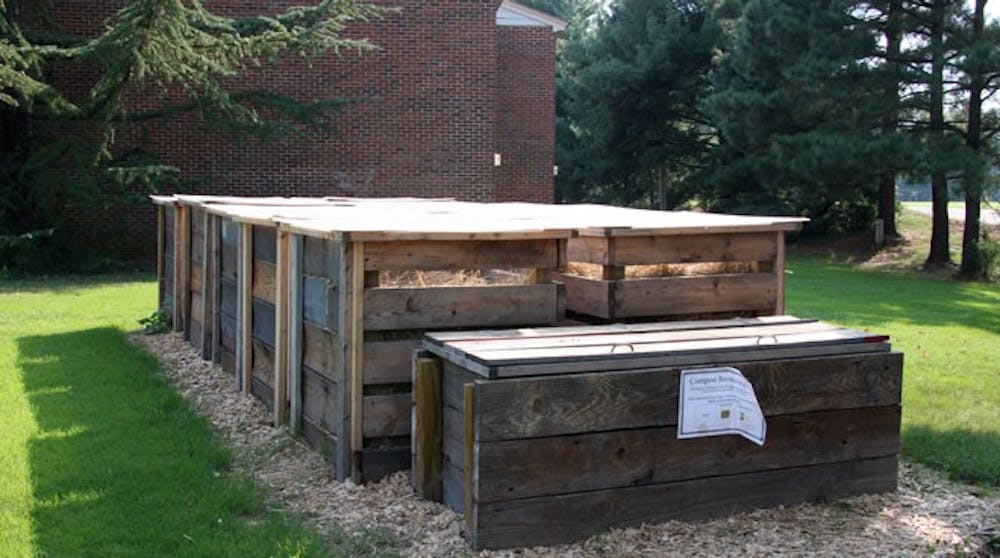Senior Megan Venable sat at her kitchen table framed by rope lights hung around the walls, excited to talk about a set of wooden bins located next to the 1900 block of the University Forest Apartments.
The bins house the compost project URot, which was started last year by GreenUR. The project, in its first full year of operation, focuses on UFA residents because they have kitchens. The bins were constructed and composting began last spring, with mixed reactions from UFA residents.
Venable is one of the supporters and shows the enthusiasm of some participants. She lives in the 2000 block of UFA and said that many of her friends in the surrounding blocks had been composting since school began.
She pointed to the white ceramic dish on the counter by the sink where she and her apartment collect their compostable waste. She even created and posted a sign next to the sink detailing what can and cannot be composted.
"I encourage composting in our apartment," she said. "I took on the job myself. I take everything to the pile. I'm doing what I can here to make it so the other three can just drop their compost in and not have to deal with anything else."
She said that her family had composted at home, which made it easier to continue at Richmond.
"For me, it's something natural," she said. "I've always done it at my house. It just makes sense. It reduces waste by so much. This is all stuff that's going to decompose anyway; it might as well be used."
Her apartment did not get compost bags from GreenUR, she said. She uses a dish on the counter.
"I just let the collection bin get full, which is about two days," she said. "It is decomposing food, so you have to think about the smell and remember to dump it."
Venable did not remember exactly how she found out about the project. She said that it had probably been by word of mouth.
In contrast to the enthusiasm of participants, a lot of UFA residents do not know about the project. Katie Ruff, a senior living in the 1900 block of UFA, is among them. Though the bins are located next to her block, she did not know what they were.
"I had no idea about the composting," Ruff said. "I saw the boxes, but I didn't know what they were."
Enjoy what you're reading?
Signup for our newsletter
She was impressed that she could not tell the bins were compost.
"It doesn't smell, so that's a good thing," she said.
After learning of the compost bins, Ruff said she was not sure that she would use them.
"I'd never think to compost," she said. "It makes me feel like I should. I just don't know what I could throw in there."
Those who do not know about the project were divided about whether they would participate.
Students in the apartments seemed to fall in line with Ruff and Venable. Those participating react with enthusiasm when talking about the project. There are still many students, though, who do not know about URot.
Senior Michael Rogers, a major force behind the project last year, said he knew that a good number of students did not know about the compost bins. He added that GreenUR had not done any advertising or educational events before the second week of classes. Their first meeting was Monday, Aug. 30.
"This year will be all about educational events and participation," Rogers said. "There will be big events that will be held one time as well as weekly events about adding composting to your life."
Rogers and GreenUR worked closely last year with Trey McDonald, sustainability coordinator, and the sustainability office to create the project. A Richmond-area business, Backyard Farmer, was brought in to assist.
Daniel Hebert, a senior involved with the project, said that he would like Backyard Farmer to come to campus and conduct another educational event, similar to the one last year.
"We want to hand out bins to individual apartments, too," he added.
"We are just focusing on getting people out and spreading info," said senior Adam Hake.
Rogers stressed that though the project was centered on UFA life, it was open to the entire university community.
"We chose the apartments because of proximity and because more cooking is done there," Rogers said. Some faculty and staff members have gotten compost bags, he said. The bags are being sold for $5 to students and $10 to non-students.
"It's very cool to see people who didn't want to have compost in their own backyards participating," he said. "We'll do the dirty work."
Rogers also said that the process did not involve much work on the part of students. He said that once the collection bin was filled in the apartment, it must be walked to the compost bins. The bag is then dropped in the smallest bin.
From there, GreenUR and Backyard Farmer take over to add straw and grass to the student compost and make sure that it is right for growing, he said.
"We will have events every step of the way," Rogers said. "When we turn compost, there will be an event. We want the next group of UR students to see what this is all about and to spread an idea that can be easily applied to daily life."
Contact reporter Kaileigh Connolly at kaileigh.connolly@richmond.edu
Support independent student media
You can make a tax-deductible donation by clicking the button below, which takes you to our secure PayPal account. The page is set up to receive contributions in whatever amount you designate. We look forward to using the money we raise to further our mission of providing honest and accurate information to students, faculty, staff, alumni and others in the general public.
Donate Now



